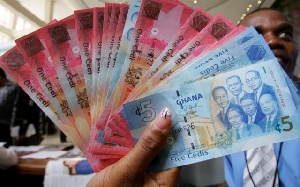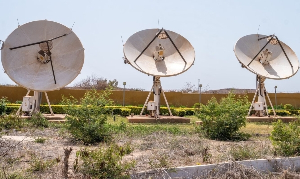The cedi began 2018 on a bearish note, depreciating against all the three major trading currencies on the interbank currency market.
At the close of trading on January 5, the cedi had registered average depreciation of 0.24 percent against the three benchmark currencies.
Although the dollar dipped on the international currency market on the first trading week of the year, the cedi failed to capitalise on the development to shine.
It depreciated by 0.05 percent to sell at GH¢4.42 per dollar on January 5.
The euro, on the other hand, found support in strong growth expectation for 2018 to notch a 3-year gain at the close of the week’s trading.
The cedi however recorded a year-to-date depreciation of 0.33 percent to sell at GH¢5.98 per euro on January 5.
The pound was also lifted marginally on the international currency market despite indications of improved economic outlook for 2017 amidst a pick-up in business sentiment for 2018.
As a result, the cedi recorded a year-to-date depreciation of 0.33 percent against the pound to exchange at GH¢5.31 per pound.
Treasury securities
In the week under review, the yield on the 91-Day T-Bill marginally rose by two basis points to settle at 13.33 percent.
The yield on the 182 Day T-Bill, however, declined by two basis points to settle at 13.87 percent.
The 2-year Treasury note also fell by 32 basis points to settle at 17.18 percent. Yields on all other treasury securities remained unchanged.
At the auction, a total of GH¢429.76 million bids were tendered and government accepted all bids.
This was however, below the week’s target of GH¢615 million. The 2-year note was the most accepted bid, constituting 54.24 percent of the total purchased bids.
At the next auction, the government anticipates to raise GH¢308.74 million of the 91 and 182 Day T-Bills and GH¢270.67 million of the 1-year note.
Equity market
The Ghana Stock Exchange (GSE) kicked started 2018 on a stirring note on the back of improved market sentiment amidst high expectations of the implementation of the recently announced downward revision of energy tariff for industries.
The GSE Composite Index recorded a year-to-date gain of 2.17 percent after settling at an index level of 2,635.67 points. The GSE Financial Stock Index also advanced to 2,366.55 points to record a year-to-date return of 2.42 percent.
Seventeen equities recorded a total volume of 1.26 million shares valued at GH¢ 4.63 million in the week under review. This represents nine hundred percent increment over previous week’s figure in terms of volume.
GCB Bank Ltd recorded the highest traded volume; it accounted for 38.44 percent of the week’s total volume.
Market capitalisation rose by 0.82 percent to settle at GH¢59.3 billion.
Price movement
A total of 11 equities witnessed price changes. GCB Bank topped the advancers with 77 pesewas gains to trade at GH¢5.82 per share. Total Petroleum Ltd followed keenly with a price uplift of 49 pesewas to trade at GH¢4.02 per share.
Standard Chartered Bank Ltd and Ecobank Ghana Ltd advanced by 11 pesewas and 10 pesewas to trade at GH¢25.36 and GH¢7.70 per share, respectively.
Ghana Oil Company Ltd and Enterprise Group Ltd upturned by nine pesewas and three pesewas to trade at GH¢2.78 and GH¢3.73 per share, respectively.
Societe Generale Ghana Ltd, Agricultural Development Bank Ltd, CAL Bank Ltd and Unilever Ghana Ltd also recorded gains in the week’s trading. There were no laggards.
Commodities
Brent crude oil started 2018 with gains, benefiting from the current supply disruptions in Iran due to the ongoing political tension and continued efforts by top producers to cut down supply of the energy commodity. It thus added 68 cents to trade at US$67.55 per barrel.
Gold ended in the gains, riding on the general weakness of the dollar to record a week-on-week appreciation of 0.88 percent.
It gained US$11.50 to trade at US$1,320.80 per ounce.
Cocoa, on the other hand, recorded declines on the international commodities market due to improved production output in top grower – Côte d'Ivoire. The commodity shed 50 cents to end the week at US$1,887.50 per metric tonne.
Coffee climbed higher in the week’s trading session against a backdrop of lower exports from Brazil and expectation that production in Vietnam will be much smaller than previously forecasted. The soft crop thus gained 2 cents to trade at US$1.28 per pound.
Business News of Tuesday, 9 January 2018
Source: IGS Financial Services/GB












